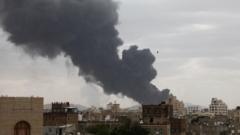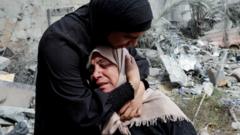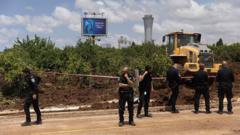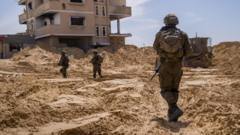The Israeli military is set to escalate its offensive against Hamas, following the recent approval from the country's security cabinet for a plan that involves the 'capture' of Gaza. This news follows the call-up of tens of thousands of reservists and a commitment to execute a "forceful operation" with the stated goal of terminating Hamas and facilitating the release of hostages. Prime Minister Benjamin Netanyahu announced that the plan includes relocating Gaza's 2.1 million residents for their protection, although the specifics of territory to be seized remain unclear.
Israel to Intensify Military Operations in Gaza with Population Displacement Plan
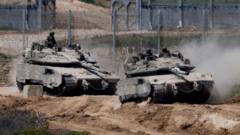
Israel to Intensify Military Operations in Gaza with Population Displacement Plan
Israel's security cabinet has approved a controversial plan aimed at capturing Gaza, intensifying military operations against Hamas while proposing measures for humanitarian aid distribution, despite widespread criticism.
Netanyahu emphasized that Israeli troops would establish a permanent presence in Gaza, a move that has raised significant concerns both domestically and internationally. Critics argue that the effort to expand military control contradicts the pressing need for humanitarian assistance and could exacerbate the ongoing humanitarian crisis. Plans to deliver aid through private companies, while bypassing existing systems, have also drawn sharp rebuke from the UN and humanitarian organizations, who view it as a violation of fundamental humanitarian rights.
As tensions mount, Hamas has dismissed Israel's strategy as coercive, while international voices, including UK officials and the EU, have called for restraint and opposed further military escalation. The proposed military actions come amidst reports of dire food shortages in Gaza due to a two-month blockade and increasing calls for genuine negotiations aimed at a ceasefire and the release of hostages.
Amid these developments, many Gazans are expressing their refusal to be forcibly relocated, recalling past experiences of displacement. Community leaders and humanitarian agencies voiced concerns that proposed aid distribution plans would neglect the most vulnerable segments of the population, warning it could create further hardships and deepen existing crises.
With over 52,000 fatalities reported in Gaza since the initiation of military campaigns, the situation remains critical as the conflict continues to evolve. The Israeli government faces mounting pressure from its citizenry and the international community to balance military objectives with the urgent need to address humanitarian issues on the ground.
As tensions mount, Hamas has dismissed Israel's strategy as coercive, while international voices, including UK officials and the EU, have called for restraint and opposed further military escalation. The proposed military actions come amidst reports of dire food shortages in Gaza due to a two-month blockade and increasing calls for genuine negotiations aimed at a ceasefire and the release of hostages.
Amid these developments, many Gazans are expressing their refusal to be forcibly relocated, recalling past experiences of displacement. Community leaders and humanitarian agencies voiced concerns that proposed aid distribution plans would neglect the most vulnerable segments of the population, warning it could create further hardships and deepen existing crises.
With over 52,000 fatalities reported in Gaza since the initiation of military campaigns, the situation remains critical as the conflict continues to evolve. The Israeli government faces mounting pressure from its citizenry and the international community to balance military objectives with the urgent need to address humanitarian issues on the ground.





